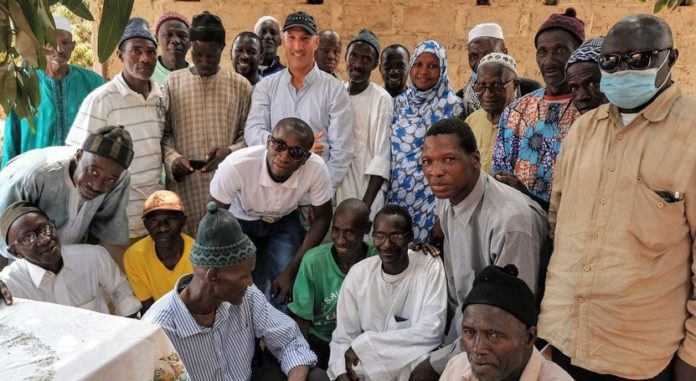By Dr Nimrod Israely,
It was early May 2021, and I was in Senegal looking to establish a large-scale field demo of Dream Valley.
The purpose was to study the feasibility of marketing high-quality mangos from the main production regions, which till now, suffer high fruit fly infestation (30% to 80%).
Hence, fruit is harvested prematurely, and the export season is short. In summary, produce quality and quantities are low, and so is the price per kg.
It is a hot day when we get in the truck and start the long journey to the south part of Senegal, the Casamance. After a long day and night trip on a bumpy road, we finally reached our destination.
THE FARMERS
The next day, together with a local mango trader, we drove to a village where we met mango growers.
Then the trader asks me to let him lead the meeting because he knows the farmers and their culture. It makes sense, and although I always did the talking in the past, I agree with his suggestion.
The trader starts by proposing the farmers an attractive deal. The farmers would get (free of charge) the Dream Valley Package, which includes the Fruit Fly Certified Trade Zone (FFCTZ) protocol. The protocol already contains the novel non-spray fruit fly technology solution, the Freedome, developed by Biofeed.
In return, the farmers would sell the trader their entire mango production.
Knowing that the current fruit fly infestation (with sprays) is 50%, and by applying the FFCTZ protocol of Dream Valley, they would decrease the infestation by over 99%, I expect this meeting to end soon and to start working with those farmers.
After all, isn’t it the dream of every mango grower? What can go wrong?
Oh, at that moment, if I only knew how wrong I was.
NOT WHAT I EXPECTED
I couldn’t be more surprised when the farmers refused the deal!
It didn’t make sense!
How is it possible? Are they crazy? Is there a better offer than that???
I asked the trader, “Why,” and he explained; that the farmers prefer working with another trader who will pay them advancements before the season, which he is not ready to pay.
I find it hard to believe that the farmers refused the deal, although they currently lose 50% to 80% fruit loss due to fruit flies.
I am shocked, and we continue to the next village and next meeting. Once again, I am surprised and disappointed by the polite “No thank you” from the farmers.
In the following villages, the show repeats itself, and we get used to hearing “No, thank you.”
I can’t believe it. What is going on?
What did we do wrong?
GIVING UP IS NOT AN OPTION
We were frustrated, and it seemed like there would be no large-scale demo. After all, how could we have a demo without farmers?
Days passed, and Friday arrived. The trader and his team decided not to wait for the last meeting scheduled for this day and left for home.
I wasn’t ready to give up, and together with two of my hosts, we drove to the village. When we arrived, I said, “This time, I do the talking, excluding the business part” (which remains unchanged).
The meeting takes two hours, and when it is overall, the growers ask to join the Dream Valley demo. I couldn’t be happier.
In the following weeks, we have more meetings where we stage the same way and receive the same “Yes, we want .”The results are fantastic, and we have reached over-booking for the program.
WHY IS THE CHANGE OF HEART?
You must be wondering, “What happened that made those farmers want to join Dream Valley and “fight” over this privilege, while before, while the local trader did the talking, they refused?”
That is a great question. To answer it, we will need to get a glimpse of how farmers think and, more importantly, to understand why current business models fail.
MISALIGNMENT OF INTEREST
In non-developed economies, uncertainty is the norm. So what do people do in an “uncertain environment”? Naturally, they are looking to reduce risks, hoping to increase their certainty.
How do Traders reduce risks?
By paying the farmers only after selling the produce or on the day of harvest.
How do Farmers reduce risks?
Get paid before the fruits leave the field, or even better, before the harvest season.
Farmers are the poorest in the value chain. If anything goes wrong, they would be the ones to suffer the most, and they know it.
Farmers know that traders think only of themselves and their profit. They remember when traders took their produce and never came back to pay. Farmers’ first priority is never to let it happen again.
In non-developed economies, farmers’ priorities are in a strict order – First to secure the minimal income, and then everything else.
Now you understand that although losing 50% to fruit flies is painful, farmers’ greater fear is losing 100% to none trusted traders. And therefore, the only way farmers would trust a trader is if he pays in advance.
WHY DID THE TRADER FAIL?
We need to dive deeper into the trader-led meetings and attitudes versus those I led to answer the above question.
In the Trader-led meetings, the parties, i.e., Trader and Farmers, were looking to secure their own interest by constructing a deal that would favor their side.
As a result, the parties’ interests were misaligned, which brought about growing mistrust and resulted in NO DEAL!
“TRUST” is an essential commodity in doing business. Everything is slow, difficult, costly, and complex, and deals are hard to reach without trust.
You see, farmers don’t trust the traders to such a level that even when they have access, with no additional costs, to the best crop protection technology and protocols, which enables them to double their income, they would refuse because of mistrust.
Do you see how misalignment of interests leads to mistrust, which eventually causes the perpetuation of poverty?
WHAT MADE FARMERS WANT DREAM VALLEY?
In contrast, the meetings I led focused on the farmers. The business details were never the issue again and were discussed at the end.
To my advantage, I would say that being a farmer and working with mango growers for 22 years helped me a lot.
I started the meetings by asking the farmers about their fears. Then came more questions (professional and others) to help me understand them better and express empathy and genuine care about them.
Then I would share my background and present the Dream Valley Package of services and technologies, which they would receive when joining the Dream Valley program.
I would say to them, “You are getting the Dream Valley Package now, ahead of the season. I don’t charge you because I trust that you would keep your produce for the traders working with us.
The Package is very costly, and if the professional results are poor, i.e., like always, I will lose my investment. However, even under such an extreme scenario, you can still sell your produce, so you may not make more money, but you sure don’t lose. You are risk-free”.
The farmers understood that; I trusted them. They see the significant risk I am taking, more than they would expect, and how our interests are aligned. They began to trust me.
Furthermore, the farmers understood that I am not an NGO or fund manager that is not personally affected and hence don’t care about the business results.
This is when they trusted me and were ready to walk the talk together.
THE WONDERS OF ALIGNED INTERESTS
The difference between the NO(s) that the traders received to the YES(s) I received was expressed in the proposal to the farmers.
The traders’ proposal was focused on a short-term deal with a minimum self-risk.
In contrast, I was looking to build long-term relations, considering the other parties’ points of view. To that end, I was ready to take – a personal – high risk. My discussion with the farmers reflected that.
We first established trust and ensured aligned interests and goals. When we had this in place, the business terms became secondary in importance.
Thanks to the Dream Valley business model, a lose-lose situation turned into a win-win reality, in which all together and everybody benefits.
“Establish common interests, and prosperity would grow.”
BONUS: STRANGE CASES
Farmers, particularly those in developed economies, have good reasons not to trust those people and organizations from outside their community.
More than once, I have heard farmers’ unfavorable opinions on projects run by NGOs, funds, and governments.
That sounds weird. Why would they be antagonistic towards those trying to help them?
To understand that behavior that may look strange, let’s examine it through the farmer’s eyes and the “aligned interests” and “trust” sharp prism.
Referring to funded “projects,” farmers would say, “Often, an NGO, a foundation, or the government shows up saying they would change everything. A short while after, they move on. After that, we didn’t see them again, and our situation worsened.”
In farmers’ eyes, the interests and goals of managers of funded projects are not aligned with theirs’. Farmers are aware that projects’ staff salaries are unrelated to their, i.e., farmers, business performance. Hence, they don’t trust them.
Do you think farmers are wrong in their fearful attitude?
Did you ever encounter such a situation?
Can you see how a business model with inherent misalignment of interests contributes to mistrust and how that can lead to poor livelihood, poverty, and hunger?
AGRA’s fifteen years multi-billion $ program demonstrates that fighting poverty and hunger with “more funds and technologies” is ineffective. This is not to say that there is no need for technologies and funds.
Dream Valley trading platform (business and operational) model was designed to eliminate critical misalignments of interests while establishing the future on trust and shared goals.
Contact me for regional, national, and international programs you find challenging and wish to push on the fast forward button.
TAKEAWAYS
» START BY THINKING about the other side’s interests.
» THE LACK OF COMMON INTEREST creates mistrust, which prevents economic prosperity.
» AGRO-INDUSTRY in non-developed economies lacks common interests, risk share, and trust.
» ADVANCED BUSINESS MODELS are based on aligned and shared interests and goals.
If you enjoyed the article please share it with friends & colleagues.
Follow me on LinkedIn.& » PRESS TO SUBSCRIBE «
*** Mental and Economic Freedom Are Interconnected. ***








